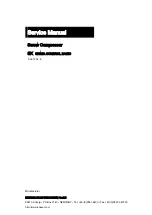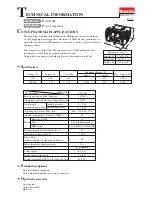
14
Cooling Air Discharge
The cooling air discharge must be restriction free. Any louvers or
ducting must not exceed a quarter of an inch static head. Above this
a booster fan will be required. Consult a local HVAC contractor for
recommendations prior to installation. Excessive restriction to the cooling
air discharge will cause the unit to operate at elevated temperatures that
could result in high temperature shutdowns. Ducting of cooling air to the
unit is not generally recommended.
Electrical
A qualified electrician in compliance with standards and local codes
should do all electrical wiring. Be sure to investigate the local
requirements before installing the compressor. The power supply should
be adequate and free of parasitic loads that will cause an under voltage
condition during the operation of the compressor, otherwise there will
be nuisance electrical shutdowns. Always connect the compressor to its
power source through a fusible disconnect and insure the unit is
properly grounded.
Unpacking and Handling
Occasionally damage will occur during shipping. Be sure to carefully
inspect the unit before unpacking. After unpacking before you sign the
receiver, if anything damage has occurred, document it with the
trucking firm immediately. Contact your Compressed Air Systems LLC.
representative for assistance.
To move your compressor to its installation site we recommend that you
leave the unit on its shipping skid as long as possible. The forks should
be extended the width of the compressor and padding should be placed
between the compressor and the truck boom.
If it is necessary to lift the compressor with a crane, we recommend the
use of the spreader bar and chains. The spreader bar should be greater
than the width of the compressor and padding is placed on
the edges to prevent chain damage. Consult the installation drawing at
the end of this section for the center of gravity.
compressor installation















































